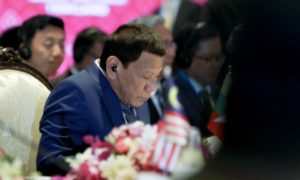NONTHABURI, Thailand — In an effort to prevent disease outbreaks, Southeast Asian leaders have vowed to strengthen cooperation to attain vaccine security and self-reliance in the region, as they recognized “overwhelming evidence” that showed the benefits of immunization as among the most successful and cost-effective health interventions.
In a declaration adopted on Saturday during the plenary of the 35th Association of Southeast Asian Nations (Asean) summit, the leaders agreed to work together to address vaccine shortage and prevent the spread and death from vaccine preventable diseases (VPD).
Leaders from the 10-member regional bloc said they would strengthen efforts among their countries to attain Asean vaccine security and self-reliance (AVSSR) through capacity building and training, sharing of best practices, as well as other appropriate developmental actions in line with national laws, policy and regulation in their respective countries.
“[We] express deep concern that essential vaccine shortages in Asean member states (AMS), even if occurring sporadically for a short period of time, directly hampers vaccine security by increasing the risk of VPD outbreaks among vulnerable or unimmunized persons of all ages, thus leading to public health emergencies,” they said.
Vaccine shortages, they said, occur due to challenges that include manufacturing complexities, supply chain constraints and limited long-term forecasting.
Mobility spreads diseases
The Asean leaders said these diseases, such as diphtheria, tetanus, whooping cough, rubella, measles and hepatitis B, may continue to spread in the region due to “massive population mobility” across countries.
“VPD occurrences therefore need to be continuously monitored while VPD prevention and control programs need to be continuously implemented, tirelessly and deliberately, by every AMS,” they said.
Under the declaration, they also called on development partners, intergovernmental agencies, regional organizations, experts and other stakeholders to support and promote regional collaboration.
Asean ministers responsible for health and other relevant sectoral bodies have been tasked with monitoring the implementation of the declaration.
“Reduction of VPD burden and reduction of health care expenditure in AMS would be among the evident outcomes of attaining AVSSR,” they said.


